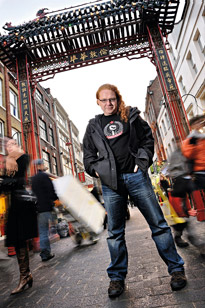Christian Heilmann
Christian Heilmann, international developer evangelist at Yahoo, travels the world on a mission to make the web a better place. Talking to Oliver Lindberg, he calls for more sharing and says innovation isn’t just down to rock star developers
Sign up to Creative Bloq's daily newsletter, which brings you the latest news and inspiration from the worlds of art, design and technology.
You are now subscribed
Your newsletter sign-up was successful
Want to add more newsletters?
There’s no denying that last year the wheels were coming off at Yahoo. A significant number of people were laid off, others were voluntarily leaving the company in droves. But there’s one man in particular who stayed and, seemingly unperturbed, carried on with what he does best: spreading the word of the open, accessible web all over the world and helping developers to make the web better. This man is Christian Heilmann.
Christian’s official job title is ‘international developer evangelist’, which means he travels around the globe to meet developers, talks at conferences, helps people start their own BarCamps and gets feedback on Yahoo products. He then comes back, gives internal tech talks and reports back on what he’s learned and where the market is going. “I do the same thing as a Jeremy Keith or a Douglas Bowman but I just do it with the backup of a big company,” Christian explains. “I could have done it as a freelancer but I think it would be a shame to leave a company where I’ve got such a great internal network and I know a lot of people.”
The same old faces
It’s time we look at the things that take up our precious time, such as bank websites – there’s not a single one that has good usability and yet they’re what we use day to day
One thing Christian has noticed on his travels around the conference circuit is that a lot of events have turned into big back-patting exercises, always featuring the same speakers. “I see people coming up with the coolest new CSS effects and the coolest new layouts for their blogs,” he says. “But I think we should stop profiling ourselves. It’s time we look at the things that take up our precious time, such as bank websites – there’s not a single one that has good usability and yet they’re what we use day to day. I come back from a conference and go to our own internal system to log my expenses and that’s two hours wasted because the usability is completely off the mark. But whenever I talk to other standardistas and suggest going to the likes of Oracle or Documentum – the people that build enterprise level systems – and making them understand the benefits of standards, the answer is always that we’d never reach those guys and why should we bother? I think it’s time we bother. Talking to each other about how cool our blogs are isn’t going to change the world. If we want to get rid of IE6 and other older browsers, we have to get rid of all the systems that are dependent on it.”
Another problem Christian Heilmann highlights is the huge gap between the development world and the accessibility world. “My biggest challenge this year is to make people who aren’t techies talk to techies in a language that each party understands. The people who need and benefit most from the open web don’t understand it because us techies are too much into our own lingo. What the hell’s a ‘password anti-pattern’, for example?!
“We have to understand that nobody needs rock stars any more. Nobody needs technical guys that come up with cool solutions that nobody uses. It’s about making things work and explaining them in layman’s terms, so people can benefit from it. I’m a big fan of microformats, for example, but I have yet to see the killer application for it.”
‘Rock stars’ in the web development world are one of Christian’s bugbears. In his opinion it should be more about teamwork than about relying on one expert. When Christian Heilmann started at Yahoo about three years ago his boss wanted to build one of the best web development teams in the world. “We assembled a lot of people,” he remembers, “but we made the mistake of assembling far too many good people, because a team has to be not only rock stars. You can’t just put rock stars together and hope something happens. A team has to consist of lead developers, rock stars and junior developers who can learn from these people and give them some breathing space. There’s no need for HTML experts. It should be a team that knows about it, rather than having a really cool rock star web developer sitting in the corner who burns himself out within half a year.”
Now’s the time for the geeks in the trenches to stand up and show they can be as innovative as those specialist departments
That’s why Christian thinks the end of Brickhouse, Yahoo’s idea incubator, doesn’t signal the end of innovation at Yahoo. “It’s a shame it got closed, but innovation is much more than just having a specialist department for it. Being a developer at the Yahoo Developer Network, I’m part of the team that looks after innovation. To me it happens by fostering internally and giving people time to build things. Microsoft does a lot of good research, Adobe has a lot of good stuff coming out of its labs, but you never see these things go live because they’re just proof of concepts and then they’re not going anywhere. Now’s the time for the geeks in the trenches to stand up and show they can be as innovative as those specialist departments. Chinese developers, for example, are stunning but they’re not the poster children of innovation. They do their work and are very pragmatic about it.”
Sign up to Creative Bloq's daily newsletter, which brings you the latest news and inspiration from the worlds of art, design and technology.
An open strategy

Christian Heilmann argues that we should focus more on improving the web and making the work easier for developers. That’s where Yahoo’s open strategy comes in. Already developers can write apps to improve search results with SearchMonkey, create their own search engine with BOSS and build widgets for My Yahoo (currently in the US only). Yahoo Mail is also gradually opening up and at CES Yahoo announced a deal to bring widgets to TVs. The Yahoo User Interface Library was recently praised as one of the most secure open source projects by security company Palamida. “My favourite part of the strategy so far is YQL [Yahoo Query Language],” Christian enthuses. “That’s just absolutely nuts. It makes all the hacking we’ve done over the last few years, with cURL and our own PHP proxies, obsolete. It’s like Pipes on a command line. For example, today I used YQL to get the transcripts of Slideshare presentations to display directly with your slides. With a PHP script it could be quite a pain but with YQL it’s like five lines of JavaScript. YQL is going to become more and more a scripting environment. It’s very powerful.”
Last September, Christian organised his own conference, Scripting Enabled. The idea was born out of the BBC’s open hack day, Mashed 08, where he presented a screen reader-friendly search interface for its audio archive. Channel 4 was so impressed it offered him money to set up an event focused on accessibility. Scripting Enabled ran over two days and had 150 attendees and seven speakers. All of the presentations and transcripts have been released under a Creative Commons licence, and anybody who wants to can run their own Scripting Enabled event. The only rule is that it has to involve real people with real world problems, so that on the second day hackers can come in and tackle these issues. “I wanted to make sure that the community of developers talks to the community of accessibility people, so they realise what technical innovation is possible and how cheap it really is. I built the Easy YouTube Player [a more accessible YouTube viewer] in about six hours. The person that asked if it was possible had offers of £3,000 to £5,000 to build one of those in about three weeks.”
Christian might run another Scripting Enabled event this year but in the meantime he’ll look into markets he hasn’t been to yet such as Australia, Taiwan and Israel. We don’t know where Yahoo as a company will be heading in 2009 but Christian, who’s also responsible for Twitter hack TweetEffect, stresses he doesn’t waste his time looking at headlines and puts his energy into improving the web. “I know for a fact that the people who are here would do the same thing in any other company because they’re proud of their work.” In the end, Christian says, developers who are very good at what they do but don’t share and don’t show an interest in what’s going on in the rest of the world will have a hard time this year.

The Creative Bloq team is made up of a group of art and design enthusiasts, and has changed and evolved since Creative Bloq began back in 2012. The current website team consists of eight full-time members of staff: Editor Georgia Coggan, Deputy Editor Rosie Hilder, Ecommerce Editor Beren Neale, Senior News Editor Daniel Piper, Editor, Digital Art and 3D Ian Dean, Tech Reviews Editor Erlingur Einarsson, Ecommerce Writer Beth Nicholls and Staff Writer Natalie Fear, as well as a roster of freelancers from around the world. The ImagineFX magazine team also pitch in, ensuring that content from leading digital art publication ImagineFX is represented on Creative Bloq.
